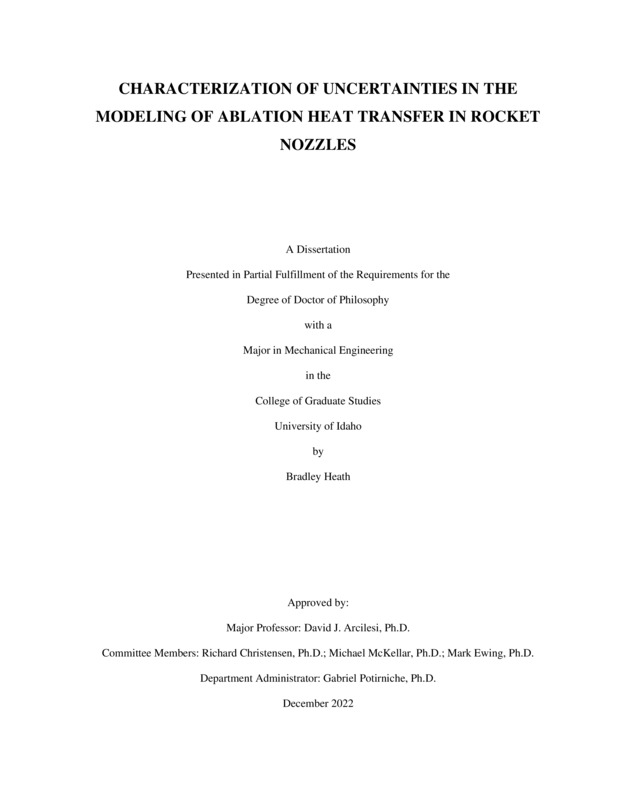CHARACTERIZATION OF UNCERTAINTIES IN THE MODELING OF ABLATION HEAT TRANSFER IN ROCKET NOZZLES
Heath, Bradley. (2022-12). CHARACTERIZATION OF UNCERTAINTIES IN THE MODELING OF ABLATION HEAT TRANSFER IN ROCKET NOZZLES. Theses and Dissertations Collection, University of Idaho Library Digital Collections. https://www.lib.uidaho.edu/digital/etd/items/heath_idaho_0089e_12477.html
- Title:
- CHARACTERIZATION OF UNCERTAINTIES IN THE MODELING OF ABLATION HEAT TRANSFER IN ROCKET NOZZLES
- Author:
- Heath, Bradley
- ORCID:
- 0000-0001-6984-5608
- Date:
- 2022-12
- Keywords:
- ablation nozzle rocket sensitivity surrogate uncertainty
- Program:
- Mechanical Engineering
- Subject Category:
- Aerospace engineering
- Abstract:
-
Ablation of carbon cloth phenolic insulators used in solid rocket motor (SRM) nozzles involves highly complex phenomena that is difficult to accurately predict. Historical and even more modern ablation predictions rely heavily on anchoring to SRM testing data to improve predictability and SRM reliability. Accelerated schedules, reductions in static SRM testing prior to flight, and a highly competitive global market are placing substantial onus on computational capability. Strong shifts from real-world testing to advanced modeling capabilities are placing emphasis on ablation modeling uncertainty. Without funding or schedule for multiple test firings it is essential to cover the proper amount of uncertainty in nozzle designs. The importance is further exacerbated by modern views of low realized risk in SRM designs. This study aims to ease these challenges by quantifying uncertainty in ablation predictions of carbon cloth phenolic insulators exposed to SRM nozzle environments. A particular historical test motor is used as a demonstration case. System response quantities of interest are erosion depth and char depth. Model and input uncertainty are quantified and characterized using a comprehensive approach. Sensitivity analysis on inputs relevant to ablation system response quantities of interest is performed to identify influential parameters. Due to the inherent extent of numerical simulations required, surrogate modeling techniques are assessed and applied based on computational efficiency and accuracy. Uncertainty in numerical models and inputs are propagated through a two-dimensional uncertainty quantification using a Latin Hyper Cube sampling methodology. Results of this study show that the primary sources of uncertainty in SRM thermal modeling are incident radiation heat flux, heat transfer coefficient, char material thermal conductivity, virgin material density, char material density, char material specific heat, and pyrolysis gas enthalpy. Uncertainty in the predictions of nozzle insulation erosion and char for the test case are provided relative to nozzle location at the 99th percentile and 95th confidence interval. Following the uncertainty quantification, approaches to reducing uncertainty and recommended future work are provided.
- Description:
- doctoral, Ph.D., Mechanical Engineering -- University of Idaho - College of Graduate Studies, 2022-12
- Major Professor:
- Arcilesi, David J.
- Committee:
- Christensen, Richard; McKellar, Michael; Ewing, Mark; Potirniche, Gabriel
- Defense Date:
- 2022-12
- Identifier:
- Heath_idaho_0089E_12477
- Type:
- Text
- Format Original:
- Format:
- application/pdf
- Rights:
- In Copyright - Educational Use Permitted. For more information, please contact University of Idaho Library Special Collections and Archives Department at libspec@uidaho.edu.
- Standardized Rights:
- http://rightsstatements.org/vocab/InC-EDU/1.0/

